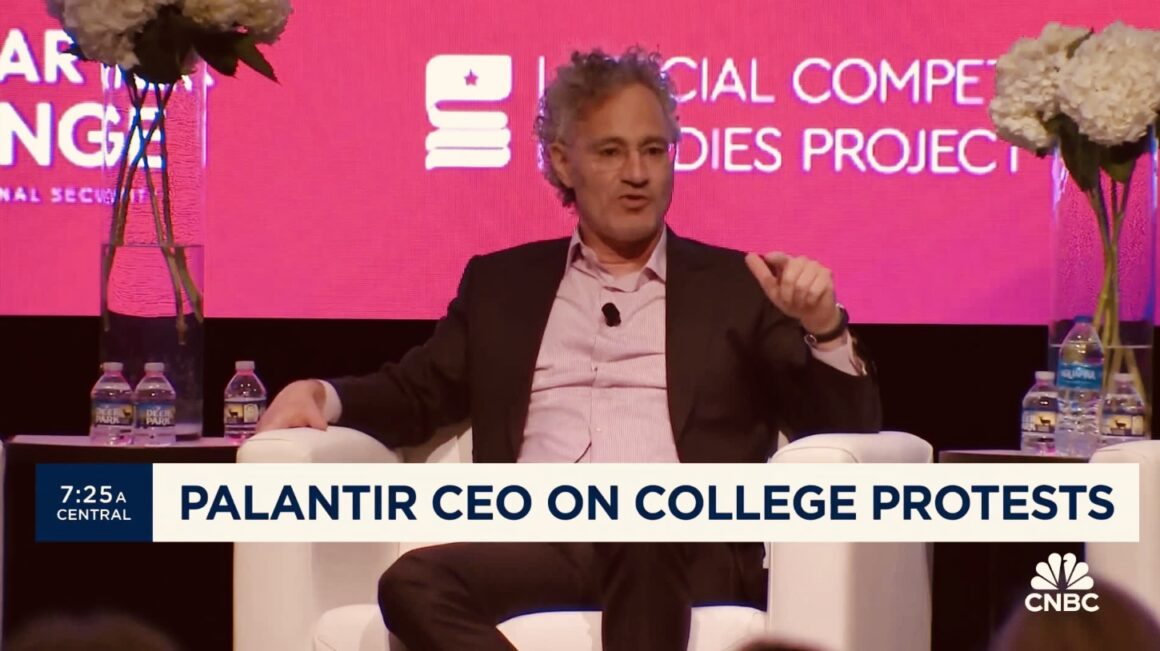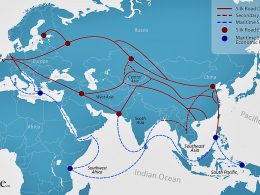The resistance to the Gaza genocide, and the reactions from our ruling institutions that it’s provoked, have given us an unprecedented piece of insight into how best we can combat monopoly capital. This insight has come from Alex Karp, CEO of the “Israeli” tech provider Palantir, who’s said in response to the student protests: “We kind of just think these things that are happening, across college campuses especially, are like a sideshow — no, they are the show. Because if we lose the intellectual debate, you will not be able to deploy any army in the west, ever.” In other words, fighting the narrative war against U.S. imperialism is the fastest and most effective way for us to harm our ruling institutions at this stage.
It was Caitlin Johnstone who brought Karp’s statement to my attention, and this essay was inspired by Johnstone’s. I have something to add to Johnstone’s analysis on this issue, though, because I’m speaking as someone who’s had experience with certain opportunistic elements within U.S. leftism. Elements that have compromised on the anti-imperialist struggle since the Ukraine conflict began, and that have justified their cowardice by asserting this struggle is essentially futile.
The idea they have is that nothing we do can have an effect on the wars our government is engaged with. But as Johnstone writes in response to Karp’s comment, this attitude is based in excessive pessimism:
While normal people are looking at the bloodshed and horror in Gaza and screaming it needs to stop at the top of our lungs, our rulers are hearing us and thinking, “Oh no, we need to find a way to get them to stop believing that narrative and get them to believe another one.” That’s what we’re seeing with all the attempts to stomp out free speech both at demonstrations and online. They understand that if they lose control of the narrative, they won’t be able to deploy their armies anymore. So please don’t make the mistake of thinking your attempts to disrupt their narrative control aren’t working. Don’t let anyone tell you your protests don’t make a difference or your dissident speech poses no threat to the powerful. If what you’re doing wasn’t working, empire managers wouldn’t be losing their minds right now.
The predominant groups within today’s U.S. activist scene base their practice around just such a flawed way of thinking. Around the belief that our efforts to change the discourse don’t have any real hope for stopping the wars. This was the notion which Brian Becker, leader of the major protest management org ANSWER, put forth in a 2007 interview with the New York Times. Wrote the Times: “Brian Becker, the national coordinator of the Answer Coalition and a member of the Party of Socialism and Liberation, said the group held out little hope of influencing either the president or Congress. ‘It is about radicalizing people,’ Mr. Becker said in an interview. ‘You hook into a movement that exists — in this case the antiwar movement — and channel people who care about that movement and bring them into political life, the life of political activism.’”
Why does Becker lack such hope? Because the model of activism he represents is not one that’s willing to take the steps which would be necessary for stopping imperialist wars. For taking the antiwar struggle out of the confines of “the movement,” and creating a mass base that can sustainably mobilize against imperialism. Such a practice is instrumental for winning the “intellectual debate,” because it’s what can render the narrative managers unable to divert the discourse after losing on one front. We get out of the movement and into the masses, and we become in firm control of the discourse. The problem is that today’s predominant iterations of U.S. leftism aren’t interested in doing this.
The realm in which actors like Becker operate is not the one of the broad masses. It’s the one of the existing activist circles. And since the U.S. government crushed the communist movement half a century ago, these circles have not represented a strong anti-imperialist movement, but rather an influence network run by Democrat NGOs. This is why ANSWER and the other biggest left orgs opposed Russia’s anti-fascist action in Ukraine: their loyalty is to the hollowed-out modern version of the “left,” with all of its prejudices against the countries that liberals don’t like.
Should the pro-Palestine struggle be led towards investing itself in this space, where the functionings of organizing are rigged to benefit the NGOs, it will fail. The ruling class will be able to successfully orchestrate a repressive backlash against the struggle, on the basis that Palestine is nothing more than a “woke” issue. This is the best option that Karp and his CIA partners now have: to isolate the pro-Palestine movement from the masses by confining the movement to left-liberal spaces, then carry out a crackdown against this fragmented and crippled movement. They want to divide and destroy the pro-Palestine struggle by guiding it towards a cultural orientation which most of the public feels alienated from, allowing for more raids on anti-imperialist orgs and censorship of anti-Zionist speech.
We have an opening to prevent that defeat for the revolutionary struggle. ANSWER has been holding back from involving itself too much in the protests, not wanting to totally invest itself within the actions until this has become totally free of risk. Which shows how ineffective liberals have so far have been at co-opting these protests, relative to the BLM protests where NGOs could more easily guide the movement’s direction. This is a great opportunity for furthering the anti-imperialist struggle, and we need to take action. In terms of the protests themselves, what we must do is go into these demonstrations and connect to the people among them who are compatible with the fight against U.S. hegemony. There are plenty of anti-communist anarchists and anti-multipolarity Trotskyists who’ve been inserting themselves into the actions. But there’s also a large element of people who aren’t invested in the efforts of these groups to divide Palestine from the struggle’s other fronts. They’re who we need to bring into CPI, PCUSA, Uhuru, or the other parts of the struggle which lack ANSWER’s baggage.
When it comes to the broader society, the majority of people who aren’t as inclined towards activism as the students, the way we can connect Americans with the pro-Palestine struggle is by relating to them on their practical interests. The average worker isn’t receptive towards the Democrat-inspired culture war posturing that the left has been relying upon for decades, that’s apparent from how the left has stagnated throughout this time. What they’re receptive to are calls to join in the class war, which is connected to the pro-Palestine cause and all other anti-imperialist efforts. We have to point to how our government is refusing to help working families, while providing endless funds for the “Israel” proxy war and other imperialist war efforts.
We know that emphasizing this idea will make us successful because when rightists like Marjorie Taylor Greene have used such rhetoric, they’ve been able to tap into support from many of the Americans who are angry about taxation without representation. Obviously this is just opportunistic posturing, as these politicians only speak out against aid to Ukraine while voting to fund “Israel.” Yet this only further shows how much we need communists, people who oppose imperialist wars consistently and who advance a proletarian revolutionary program, to adopt such mass-focused language on antiwar issues. Prioritizing the left wing of the culture war will only earn us support from a niche. Relating to the masses on their material needs will earn us popular support. If we refuse to surrender this kind of rhetorical power to the rightists, and we prevent the pro-Palestine movement from being captured by the NGOs, we’ll prevail against the ruling class.
————————————————————————
If you appreciate my work, I hope you become a one-time or regular donor to my Patreon account. Like most of us, I’m feeling the economic pressures amid late-stage capitalism, and I need money to keep fighting for a new system that works for all of us. Go to my Patreon here.
To keep this platform effective amid the censorship against dissenting voices, join my Telegram channel.








